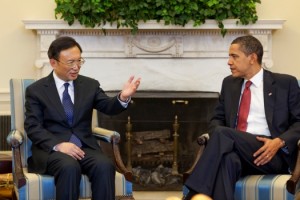
The President makes good on a campaign promise and enforces the law. What now?
President Obama’s decision to provide relief a year ago on imports of car and truck tires from China is achieving the desired positive effect on U.S. makers and their workforce, according to a new report just issued by the Alliance for American Manufacturing.
AAM claims the tariff is achieving the desired positive effect on U.S. tire manufacturers and workers, and is no doubt lobbying behind the scenes to make sure the tariffs stay in place.
The report comes as the U.S. economy continues to languish with record post war unemployment levels, a surging trade deficit, a collapsed housing market, as well as frozen credit markets – all contributing to voter’s concerns over evaporating middle class jobs and declining consumer confidence, where two-thirds of economic activity is customer rather than business driven.
The report prompts a series of policy questions as to why the U.S., alone among industrial nations, doesn’t do more to protect its people and markets and jobs – a contentious subject that will be part of the upcoming mid-term Congressional elections. Insiders expect the U.S. Labor Department to report this Friday that the economy lost another 80,000 jobs in August after dumping 131,000 in July – just in time for the Labor Day weekend holiday.
In the current case, the United Steel Workers Union in 2009 sought an investigation into a sudden influx of Chinese tires using the Trade Act of 1974, which was designed to give the domestic industry and its workers relief from such surging imports.
A growing number of critics of China contend that market distortions in the state-controlled Chinese economy include exchange rate management, massive government subsidies and help from state banks. In addition, China’s industrial policies and practices regarding export requirements for investors, technology transfers and non-tariff barriers to trade are inconsistent with WTO rules, it’s said.
The U.S. trade deficit with China is through June – at -$119,452,000,000 – is on track to set a record in 2010. And the Obama Administration is attempting to head off Congressional calls for action on the severely undervalued Chinese currency, the RMB or Yuan.
When the International Trade Commission (ITC) examined the huge increase in tire imports from China, it discovered material injury to the domestic industry through declines in U.S. producer’s domestic capacity, production, shipments and employment from 2004 to 2008, a period of general economic growth. (See ITC Rules China’s Largest Tire Maker is Illegally Dumping in the U.S. and Killing American Jobs)
Notably, domestic capacity declined from 226.8 million tires to 186.4 million tires during the four-year period while actual production dropped from 218.4 million tires to 160.3 million tires. As capacity utilization fell from 96.3% to 86%, the number of production workers substantially declined, as did their hours worked and wages.
An estimated 5,000 U.S. jobs were eliminated during the past five years, as Chinese imports tripled and seven U.S. tire plants closed.
“When China came in to the World Trade Organization, the U.S. negotiated the ability to impose remedies in situations just like this one,” said United States Trade Representative Ron Kirk at the time.
The White House then announced that it would follow the recommendation of Kirk and impose tariffs for three years on Chinese-made tires starting last September. (See President Imposes Tariffs on Chinese Tire Imports) President Bush chose not to do so in several similar cases under his administration.
The three-year penalty adds an additional tariff on top of the current 4% of a 35% ad valorem tax in the first year, 30% in the second, and 25% in the third, is being imposed after the disruption finding.
“With relief in place, American workers are finally beginning to see jobs return to their communities. We must maintain that momentum and allow the tariffs to stay in effect for the full three years,” said President Leo W. Gerard of the United Steel Workers union, which represents U.S. tire workers.
“To do otherwise would be to break the repeated promise to American workers and companies that they would not be unfairly harmed,” Gerard concluded.
“There is no doubt that the relief authorized by the President has reversed the massive decline in domestic production,” said USW International Vice President Tom Conway, who heads negotiations with Goodyear.
“Goodyear plants producing 421 subject tires hired 130 new workers in 2010 and are working an average of 20% overtime. Cooper Tire in Texarkana, Ark., has 250 new hourly hires. The plant is running seven days a week and production is up around 20%,” Conway said.
The impact at Michelin plants manufacturing covered tires under BF Goodrich and Uniroyal brands is similar. Operations now run seven days a week; overtime is up to 15%, and 115 new production workers have been hired since the start of 2010.
At Cooper Tire & Rubber in Findlay, Ohio, 100 new hourly employees have been hired since the relief went into effect; operations have returned to a seven-day work schedule; and production has increased 20%.
Since the 2009 recession, tire production by U.S. producers has increased significantly. Consumption has also increased as the price discrepancy between American and Chinese produced tires diminished.
